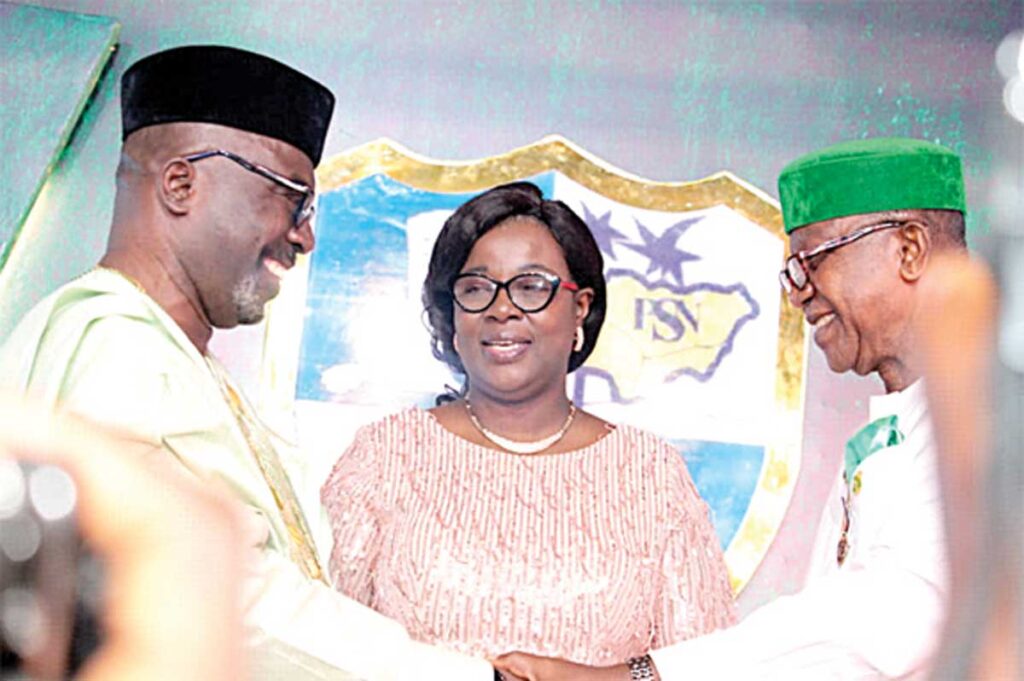
Minister of State for Health, Dr. Adeleke Olorunnimbe Mamora has called on the Pharmaceutical Society of Nigeria (PSN) to work with the Federal Government towards making Nigeria a regional hub for vaccines manufacturing in Africa.
He also stressed the need to make Nigeria self-sufficient in the production of finished pharmaceuticals and Active Pharmaceutical Ingredients (APIs).
Speaking at the inauguration of a new president and investiture of 112 new fellows of the Society in Abuja, Mamora observed that the COVID-19 pandemic has shown that the country cannot continue to rely on the importation of about 70 per cent of her gross domestic need of finished pharmaceuticals and APIs.
The medical doctor insisted that Nigerians must collectively change this narrative by making the country self-sufficient in the production of finished pharmaceuticals and APIs stressing that the Ministry is determined to achieve this and looks forward to partnering with PSN.
The minister said that the Federal Ministry of Health is seriously working to acquire capacity for local vaccines manufacturing and appealed to the PSN to partner with the Ministry to ensure that it realises this objective.
Mamora disclosed that the ministry is currently partnering with May & Baker Nigeria PLC in a Public Private Partnership (PPP), which birthed the Biovaccines Nigeria Limited (BVNL)- a special purpose vehicle towards local vaccines manufacturing.
The minister said the pharmaceutical sector is a critical component of the national security architecture and “we must do our best to bequeath a viable and competitive pharmaceutical sector to the generations unborn.”
He stated that in keeping with this desire, the Federal Ministry of Health ensured the creation of the new pharmacists consultant cadre for public and civil servants adding that the cadre confirms the place of specialisation in pharmacy, especially in the clinical settings.
According to the minister, the pharmacists cadre will lead to better patient management outcomes and contribute to the improvement of the nation’s health indices while the ministry ensured the training of community pharmacists in order to prepare them for the emerging roles of pharmacists and pharmacies in national immunisation programme and primary healthcare services in line with global trends.
He said, “Medicine remains the bedrock of healthcare delivery services. Without medicines most diseases are untreatable. This is why the pharmacy profession is such an important human resource for health and government will continue to create a conducive working environment for the practice of pharmacy regardless of the field of pharmacy one chooses to practice whether hospital, administrative, academics, industry or community.
“To our celebrants, the new fellows of the PSN, I wish to assure you that the Federal Ministry of Health stands shoulder to shoulder with you to advance the pharmacy profession for the health and social welfare of Nigerians. Through its appropriate agencies, the Ministry will continue to support your efforts toward encouraging pharmacy education, research and scholarship, and promote high ethical standards of the pharmacy profession. Let me assure you of the Government’s readiness to partner with the PSN as always, to further the course of pharmacy practice and the pharmaceutical sector in Nigeria.”
The minister urged the pharmacists to actively engage in search of new methods and systems to improve the use of medicines, acquire needed skills and knowledge in order to remain relevant with advancing technology as it relates to pharmacy sector and taking the pharmacy profession to even greater heights.
“This event is particularly significant because it’s the celebration of the emergence of an erudite scholar and an outstanding achiever as well as the rewarding of the efforts of pharmacists who have rendered meritorious services to the profession of pharmacy in Nigeria and across the globe. Without a shadow of doubt, the emergence of Prof. Cyril Odianose Usifoh as the new President of the PSN is a clear indication of the readiness of pharmacists all over the country to consolidate the gains of the past presidents of the Society and open new frontiers toward developing the pharmaceutical sector,” he added.
In her keynote address, the Vice Chancellor of the University of Benin, Prof. Lilian Salami, said pharmacists are not just the custodians and fabricators of drugs, they are also great administrators adding that a nation is as strong as its medicine security.
She said: “In many ways, pharmacists secure their nations and contribute to developing the economy. Pharmacists are the experts in drugs, they discover them, manufacture them and are the repository of knowledge on how they should be handled and used. Pharmacists counsel on the adverse effects of drugs and play clinical interventional roles that bring huge positive outcomes to patient treatment.”
The VC observed that Nigeria can achieve reasonable self-sufficiency in drug production stressing that the drug distribution channels need to be sanitized to remove the presence of fake and expired medicines.
Salami said, “As a profession, PSN will have to play her part. The Nigerian society desperately needs the spark from PSN. Every Nigerian needs to feel the impact of pharmacists the more. The future of a society rests on the quality and orientation of the coming generation. As it is often said, the youths are the leaders of tomorrow. It follows that we must pay more attention to them. We have to train them well. Being young and impressionable, they are bound to make mistakes but it is our responsibility to correct them. We have to be stern when we should but we should show them love nevertheless.”
The VC lamented that the burnt-out light in the pharmaceutical sector is a reflection of what is happening in other sectors, noting that things have fallen very short of their expectations.
“Our population has grown astronomically but infrastructural development has not kept pace with it. I recall when the big multinational drug manufacturing companies had plants in Nigeria. There were Boots, Beecham, Hoechst, Sterling-Winthrop, Parke Davis and others. To strengthen the pharmaceutical manufacturing capacity of the nation, the Federal Government established the Eleme Petrochemical Company as a subsidiary of the Nigerian National Petroleum Company (NNPC) to produce linear alkyl benzenes as starting materials for the local synthesis of drugs. Decades afterwards, we still largely import most of our medicines. Indeed, it has become an investment in frustration amidst massive purported infrastructural expansion without corresponding development. There has been a recurrent argument that the Nigerian State is under performing due to lack of capacity to tackle effectively the contemporary complexities of governance.”
Salami decried the high rate of substance abuse among Nigerian youths and regretted that ritual killing and Internet fraud have taken roots and seems to be the new norm.
In his remarks, the new PSN President, Prof. Cyril Usifoh, pledged to provide a purpose-driven leadership for all technical and interest groups of PSN with the cooperation of his colleagues in National Executive Committee (NEC) and Council in order to change pharmacy and indeed the ‘Pharmaspace’ positively for the patient, pharmacist, healthcare team and indeed Nigeria.
Usifoh said the PSN can ensure an enabling environment for pharmacists and the implementation of responsible use of medicines by building constructive partnership through effective communications with core operating principles of accountability, professionalism and transparency and also improve the visibility of pharmacists, properly network with the healthcare team and other professionals for the growth and development of Nigeria.
Usifoh urged all pharmacists to embrace genuine dialogue, listen to each other and forgive one another despite their differences adding that his leadership will always listen and act appropriately.
He said, “ If we want a united and progressive Pharmaspace where pharmacists are increasingly relevant and respected for their invaluable contributions, then we need to work as a family. Let us strengthen the bond of unity, as men of honour. We should reconcile knowing you may be right today and wrong tomorrow. We must forget our ‘carry overs’ especially those of anger and bitterness.”













